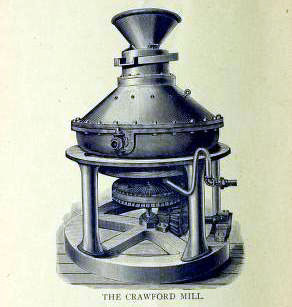
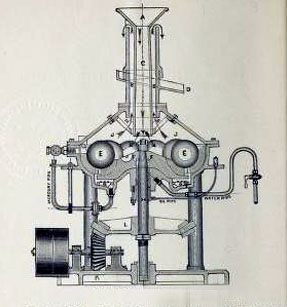 Left: The Crawford Gold Mill, Right. "Cutaway" view of the Crawford Gold Mill
Moreton Frewen ignored the lessons from Wyoming and Wisconsin and with the money from Hyderabad and income resulting from
the death of his brother Richard, Moreton embarked on a series of financial disasters which forever ruined stained the rags which were left of his
reputation. First, he invested in the promotion of the Crawford Gold Crushing Machine.
Left: The Crawford Gold Mill, Right. "Cutaway" view of the Crawford Gold Mill
Moreton Frewen ignored the lessons from Wyoming and Wisconsin and with the money from Hyderabad and income resulting from
the death of his brother Richard, Moreton embarked on a series of financial disasters which forever ruined stained the rags which were left of his
reputation. First, he invested in the promotion of the Crawford Gold Crushing Machine.
In 1892, the Crawford Mill was invented by Middleton Crawford of Ontario and patented in both the United Kingdom and the United States. The mill was supposed to take low-grade ore sush as might be found
in the tailing of gold mines and mechanically grind the ore further so as to
be able to separate "free" gold of the rocks. As can be seen in the cutaway drawing of the mill above,
large steel balls, marked "E" in the cutaway drawing, would grind the rocks, a steam of water would separate the rock pieces and the gold
particles would fall through a mesh and would be further separated through the use of mercury. Crawford had earlier been
a grist miller and thus the machine was similar to that used in milling flour. The mill was tested in several low-grade coal mines
near Belleville, Ontario. A syndicate, the Mechanical Gold Extractor Company headed by Erastus Winman, was formed to manufacture the mills.
At the 1892 Columbian Exhibition, the Gold Extractor Company exhibited its newly patented
Crawford Gold Mill. The machine was supposed to provide a method of extracting
gold from the tailings of mines. Promotional materials for the company quoted Moreton as indicating that the machine
would be ranked with those of Sir Richard Arkwright inventor of the "spinning frame" which enabled the textile industry to be moved
to factories, George Stevenson's steam locomotive, Bessemer with
steel and the inventions of Thomas A. Edison. In his promotions Frewen seemed always
prone to exaggeration. In one promotion of the gold machine, Frewen wrote:
"I venture to think that Mr. Crawford has done more than
merely invent a machine. He seems to me to have discovered a
principle — a principle, not known to science, or if known, then, hith-
erto neglected. It is an evolutionary machine ; one that may rank
in the history of this century with the inventions of Arkwright
and Stevenson of Bessemer and E lison. Of course, the natural
affinity or avidity of mercury for gold has been kuown for centur-
ies past, but Mr. Crawford's machine now declares to the world
for the lirst time this important fact: That by the sub division of
quartz into infinitesimal particles, all tho gold contained can be
released from the quartz and caught by the mercury and that in
short, given atomic pulverization, all gold is "free."
In the meantime, Lord Randolph Churchill's fortunes had taken a downturn. He had been dependent upon his salary first as
Secretary of State and later as Chancellor of the Exchequor. Political careers are somewhat unpredictable. The Tories were
turned out of office. His finances were such that for a while he and his family had to move in
with the Frewens. Lord Randolph was advised by Moreton, among others, to seek his fortune in gold mining in
South Africa. With borrowed funds, Frewen talked his brothr-in-law Lord Randolphinto investing in Frewen's syndicate to manufacture and
promote the machine. It was proposed that Lord Randolph would market the machine to
Cecil John Rhodes. The machine would make usable gold tailings. However, Lord Randolph sought advice from the Rothchilds who led him
to a mining engineer and others. They all advised against involvment with Frewen and his machine. Lord Randolph then withdrew from
Frewen's syndicate and left Frewen and the machine behind. Instead Lord Randolph financed his
expedition with a contract with the Daily Graphic. The paper paid him as a correspondent
£100 per letter describing his quest. His original exploration in Cape Colony proved a failure, but he invested a small sum with
another mining outfit, Rand Mines. Lord Randolph was with the proceeds from that one investment able to repay all
debts and left a substantial trust in favor of his two sons, [later Sir] Winston Churchill and John [Jack} Strange Spencer-Churchill, DSO, TD (1880-1947).
Jack served in South Africa as did Winston and was wounded in the relief of Ladysmith. Winston spent a small portion of his inheriance on
Chartwell Manor. The money Churchill inherited as well as from his writings enabled Churchill to support himself comfortably whilst he wandered in the political
wilderness prior to World War II.
With the failure to sell the machine to
Cecil John Rhodes, Frewen took the machine to Australia.
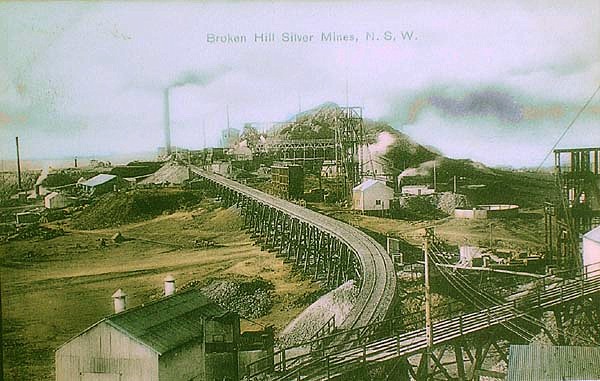
Broken Hill Mine, New South Wales, prior to 1914.
There, he invested in mining in
New South Wales (the Broken Hill Mines). He had hoped to sell his machine.
The machine did not work. The rocks crushed the workings of the machine,
rather than the machine crushing the
ore. The promotion of mining at Broken Hill, however, was sucessful. Broken Hill proved to be the richest
silver mines on earth. It
made those investing in the mines rich. Lord Kintore made millions on the increase in value of
his shares.
Moreton, however, successfully managed, as he had done in the past and as he would in the future, to pluck
disaster out of the jaws of success. He sold his interest in Broken Hill at a large loss in order
to fritter away the proceeds on various half-baked schemes. The result was he had to
beg his brother Richard for money to return home.He proposed to sell his reversionary
inheritance in Innishannon to Richard. Richard declined since he was afraid that
Moreton would again squander away any money.
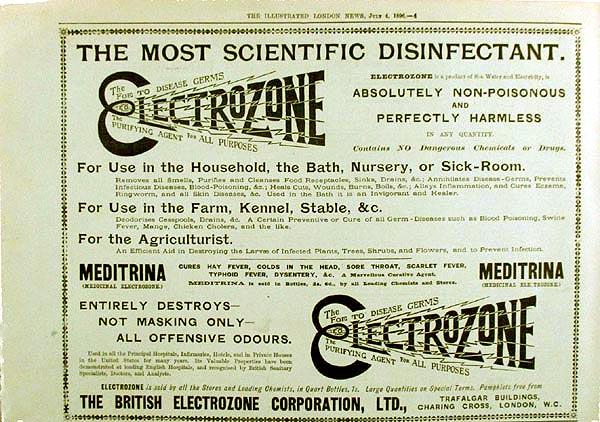
Advertisement for Electrozone,Illustrated London NewsJuly 4, 1896.
Upon his return to the United Kingdom, Frewen devoted money borrowed at high interest rates to the promotion of
"Electrozone," a foul smelling liquid made by applying electricity to sea water. He claimed it was a curative for everythings from
cholera to rotting fish. Frewen was able to convince Lord Roberts to use the substance on the sore backs of draft horses.
He employed the infamous Horatio Bottomley as a frontman for its promotion.
In both the United States and the United Kingdom each of the claims for the curative powers of the
product were found to be false and fraudulent. Bottomley was slippery so that it took many years for the Crown to
make a charge stick.
Frewen for a time resided in the game keeper's house at the
family manor, the allegedly haunted Brede Place, which Frewen's wife Clara had purchase from her brother-in-law Edward about
1896.
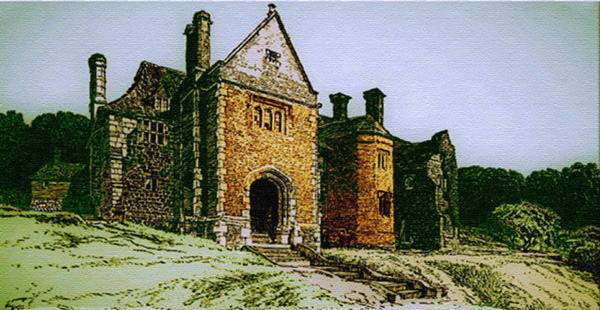
Brede Place circa 1906.
Frewen's daughter Clare described Brede in her 1924 autobiography, "Nuda Veritas":
On the eve of our inheritance of Innishannon, it happened
that my mother had enamoured herself of Brede Place, a
fourteenth century ruin on my uncle Edward Frewen’s estate
in Sussex, and he had allowed her to buy it. We must have
been at that time either very prosperous or very imprudent.
We had transferred from Aldford Street to a much larger house
in Chesham Place ; we therefore had three houses, and each
in its different way required considerable upkeep. Brede alone
could absorb a fortune like a bottomless well. It had been
acquired for the sake of its lands by Sir Edward Frewen in
16S0. The land was valuable, but to a man whose ancestral
home was five miles away the house was useless. It was an age
when antiquity counted for nothing. Even the Tudor fire-
places and the oak panelling that shone like varnished tortoise-
shell were not deemed worth removing. The family of a
gamekeeper inhabited two rainproof rooms most of the floors
and all the window panes had long since ceased to be. Swallows
built their nests on the mantelshelves, and the keeper’s boy
knocked nails into the panelling and festooned chains of starling
eggs round the walls. The chapel was a barn, storing grain
and straw. By a miracle the Perpendicular east window-
exposed to all the sea storms — still stood intact. It was this
window which set my mother’s heart on ownership and restor-
ation. Her Americanism with all its appreciation of historic-
tradition spread a full sail ; she was determined and undaunted.
My father, accustomed in his boyhood to birds’-nests among
Brede’s rafters, smiled indulgently and was finally persuaded.
Some small inadequate renovation was attempted. A floor
laid down, a ceiling mended, some window lights adjusted,
a door or two rehinged; and before it was the least bit habitable
the American novelist, Stephen Crane, frail in body, his days
numbered, begged — with a large managing wife— to shelter
beneath Brede’s eaves. He was, so to speak, bowled over
by the sedate grey dignity of this remnant of mediaeval England.
Like Henry James in his cobblestone street four miles away
at Rye, Stephen Crane wrapt himself round in Sussex sea-mist,
and the two Americans were assumed to be more " Sussex ”
even than those who had been bred for generations on its cold
clay soil.
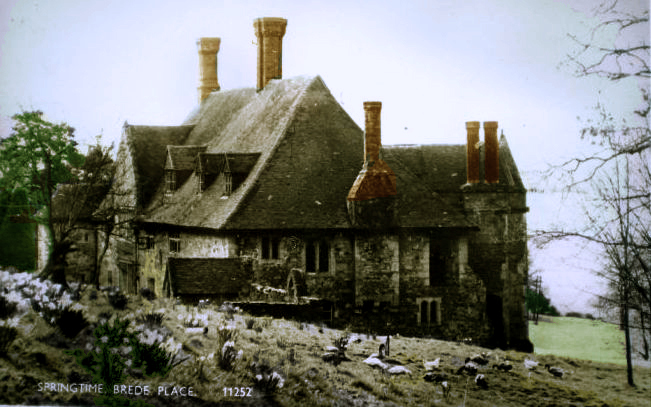
Brede Place undated.
Amongst the ghosts of Brede Place was that of Sir Goddard Oxenbridge who allegedly dined on small
children. The children of Sussex, fearful of being eaten, joined together and tempted
Sir Goddard with a barrel of mead upon which he got drunk and passed out. The children then took a
saw and cut Sir Goddard in half.
With his brother's death in 1896, Frewen inherited the hunting lodge in
County Cork. The income from Ireland provided Frewen with £2,000 a year. An additional inheritance
in favor of Frewen's wife provided another £1,000.
Since Brede Place was basically uninhabitable,the Frewens moved to Innishannon a short distance north of Cork.
There Frewen took delight in creating a fish
hatchery to stock the river with rainbow trout. Clare explained:
My father’s great hobby in those days was a fish hatchery,
his idea being to “stock” the river and make of it the finest
fishing in the South of Ireland. A Scots gamekeeper was
accordingly installed who understood the science of hatching
fish. Into a long shed through raised wood tanks a mountain
stream was deviated, which flowed over the rows of fish eggs
on trays to the small tanks containing " fry,” and thence to
the ponds full of yearlings, and so into the river. There were
salmon as well as rainbow trout spawn. The “rainbow” were
an experiment They gleamed translucently as they crowded
to the surface, or leapt into the air when the sieve full of raw
minced liver was lowered into the water at feeding time. Every
day my father went to look at his fish with almost childish joy.
One night the wooden aqueduct that carried the stream into
the fish hatchery was removed, with the result that all the eggs
and fry were found dead in the morning. Moreover, the
beautiful yearlings in the ponds had been poisoned and were
floating belly upwards. Of all the misfortunes that ever
descended on my father’s head, this was the one perhaps that
hurt him most. It was a devilishly wanton act, as senseless
as it was cruel. My father had regarded his fish hatchery
as a communal benefit. We had our fishing rights, it is true,
but the river belonged to all. This manifestation of hostility
was very surprising on the part of a people by whom we believed
ourselves beloved. Whenever any of us set foot outside our
gate we were greeted with, “ May the Lord bless yer honour,”
and “The Holy Saints preserve you and keep you long!"
with so many compliments in addition that it was difficult to
understand why, as they were so charming to us by day, they
cut down our apple trees at night, uprooted our vegetables
and turned their cows into the garden to trample on the
flowers.- (The Scots keeper has since been murdered, and
our house is a blackened ruin, and so that finally decides their
opinion of us!)
Writer's note: the keeper, Frederick Stenning. was employed by
Frewen about 1899 and also acted as ground keeper and later after
the Frewens moved to Brede Place as subagent. He was shot down by three members of the IRA in the hallway
of the house in from of his wife and childen on March 31, 1921. On June 25, 1921, the
IRA burned down the house along with five others. The IRA contended that
Stenning was a loyalist spy. The Frewens moved to Brede Place about 1907. Clare did not return to
Innishannon for fifteen years. On June 25, 1922, she returned to the remains of her childhood home:
As I drove through Innishannon village, where
I used to know everyone by name in every house and pub and
cottage, people stared at me, hesitated and then smiled and
waved. It reminded me of the scene in “Blue Bird” where
those who had been long dead awakened to life the moment
they were remembered by the living. Innishannon was for me
a dead world, and these people who smiled at me and waved
seemed to be the phantoms of the past, who on the morrow
would all be dead again.
At a turn in the road the motor stopped before a gate and the
driver asked if it would need to be unlocked.
“It will not,” I answered, “it feels more like old times to
scale the wall. ”And so I climbed into the garden that was
full of weeds but smelling like Paradise, because of the syringa
hedges that were in full bloom.
As soon as I came in sight of the house, its hollow walls
standing up against the blue of the sky, I began to tremble
from head to foot with a rigour of emotion. The ghost of a
little girl who had once been me, seemed to be leading me by the
hand and saying, "Don't you remember?” Countless
incidents of the past came surging back. A climbing Gloire de
Dijon rose that had survived the fire still bloomed triumphantly
round Peter’s bedroom window, but for all the tangle of
flowers, and the sunshine of the moment, desolation reigned
supreme. I tried to push through an old gate that had been
thrown across the open doorway, but an uncanny wailing
sound arrested my intention (as also the beating of my heart),
but I discovered to my shame that the banshee was merely the
swinging of the stable door!
Writer's note: Peter, Clare's brother Oswald Frewen.
In the 1930's, Clare travelled to the United States. Crossing the country she visited an Indian Reservation and
stopped by the former site of her father's 76 Ranch just below the Forks of the Powder. There was nothing to indicate
the log mansion's former presence, nothing that is
except an insulator on the ground from the now-gone telephone line connecting
the house to Powder River Station.
In 1905 and 1906, Frewen travelled to British East Africa planning on obtaining a timber
concession. His former manager of the feed lot operation in Superior, Frederick R. Lingham. had made a fortune
shipping cattle and timber from the United States to South Africa and owned his own steamship line.
Unfortunately there was another minor detail. To where the timber was, there was no railway.
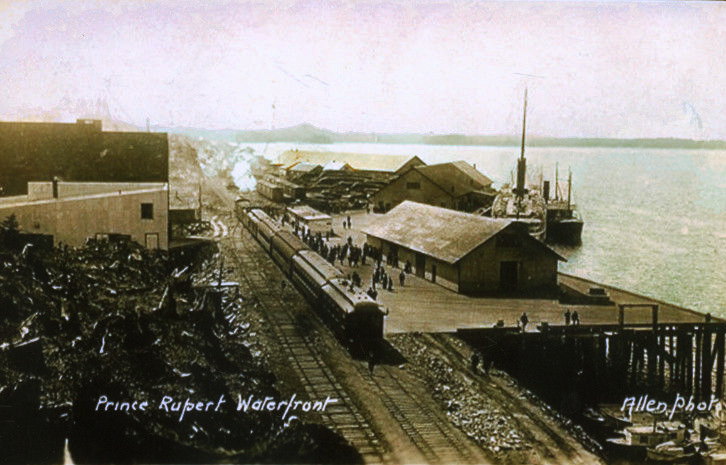
Waterfront Prince Rupert, B.C. undated.
About 1909, Frewen began a scheme for the acquisition of one thousand lots in Prince Rupert. At the time, the Grand Trunk Pacific Railway had commenced construcion of a
fourth transcontinental railway with its terminus in Prince Rupert. The Company had already put in several steamers to connect the
ports of British Columbia with Seattle.
As the Grand Trunk Pacific Railway was progressing eastwart across British Columbia, Prince Rupert was to become a port providing
a faster ocean voyage to Asia than going though the Panama Canal. Goods and people would travel from
Britain to Asia via White Star Liners to Canada, then across Canada on the Grand Trunk Railway, and then from Prince Rupert
to Asia. Frewen apparently thought he had an agreement with Grand Trunk's president Charles Melville Hays to purchase 1000 lots in Prince
Rupert.
The railway would, however,
not sell the lots to Frewen upon terms agreeable to Frewen. Frewen sued. He lost both in
the trial court and the British Columbia Court of Appeals. He then with borrowed money appealed to
the Privy Council. Frewen had hoped the agreement could be finalized in Montreal whilst the appeal
was pending. At the time Hays was in the United Kingdom and Frewen was in
New York.
On March 20, 1912, the Privy Council ruled against Frewen noting that
the alleged agreement had not been finalized. and therefore there was no basis for
Frewen's alleged damages. The penultimate sentence was devastating As stated by Lord MacNaghton in Frewen v. Hays, 16 B.C.R. 143:
As regards damages, the company seems to have
followed duly the course prescribed by the agreement, and
there has not been in their Lordships’ opinion any breach of
contract on their part.
It was stated without contradiction that if the plaintiff had
accepted the prices fixed by the company he would have made a
profit of something like 100,000 dollars. The loss of that profit
appears to be due entirely to his own conduct.
Their Lordships will, therefore, humbly advise His Majesty
that the appeal should be dismissed with costs.
Nevertheless, Frewen was undeterred. He still planned to travel to Montreal upon Hays' return to Canada from the United Kingdom and with
his silver tongue enter into
a new agreement. In the early morning hours of April 15, 1912, the ship upon which Hays was
traveling struck an iceberg and sank. Hays was not among the survivors.
Thus, Frewen's hopes and dreams for fortune sank with the Royal Mail Ship Titanic.
No longer able to obtain investors in his schemes, Frewen embarked on the writing of his memoirs and continuing with various articles on "bimetallism."
His memoirs took longer than he expected. He wrote to an old correspondent S.P. Panton in April 1922, that he feared he "left it until it was too late." See
Casper Daily Tribune, April 13, 1922. The letter is significant in that it revealed Frewen's possible involvement in the Johnson County War and the efforts to obtain
federal intervention. Panton was one of the original surveyors of Yellowstone
National Park and later was an editor in Billings and had an interest in economics. Several years earlier, Frewen
had written Panton waxing nostalgic of his days in Wyoming and fishing in the Tongue River. See Buffalo Bulletin, July 27, 1916. In 1922, Frewen suffered
a dehabilitating stroke. He died on September 2, 1922.
Many of Frewen's schemes while a financial disaster for himself, ultimately proved to be successful for others.
Frank A. Kemp who was employed on the "76" became a. successful cattleman on his own. F. W. Lingham was very successful in shipping live beeves abroad to South Africa.
Lord Kimtore an investor in Broken Hill by holding on became a millionaire. Frewen either through impatience or a need for
money always seemed to sell out too early and at a loss. In the instance of the Grand Trunk Railway, he held on too long and lost everything.
Frewen did not finish the autobiography. Much of it contains "filler" of previous articles he had
written relating to bimetallism. The book ends with his memory of Hyderabad prior to 1897 with several paragraphs
as to Col. and Mrs. Richard Nevill. In which he mis-spells the Colonel's surname and totally omits the forenames of
both. He refers to the Colonel as "General." The two later died within one week of each other. The Colonel
is interred in the Hyderabad Roman Catholic Cemetery and Mrs. Nevill in the Protestant. See Vol 5, Chowkidar,
Spring 1990, p. 99.
Clare wrote of her father, "[H]e has a
radiancy about him. Perhaps he has started to hatch rainbow
trout in the rivers of Paradise? Perhaps he has formed a
league of British Imperialist angels to sing Kipling. Perhaps
he has found that God is a Bimetallist."
Frewen's life was perhaps
presaged by the motto on his family arms, "Mutare non est meum", loosely translated,
"It is not of my nature to change."
Next Page, Wild Horses.
|